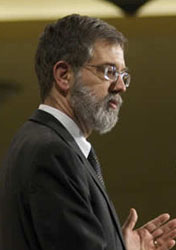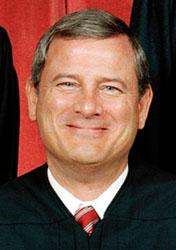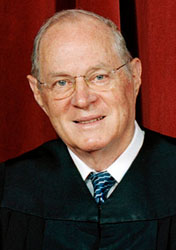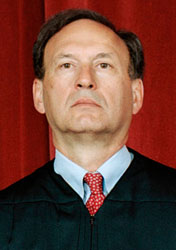The Supreme Court tackled Wednesday morning the question of “severability,” whether the health law in its entirety should be struck down if the insurance mandate is declared unconstitutional. The Obama administration argued in briefs that only two provisions tied to the mandate — requiring insurers not to discriminate against people with pre-existing conditions — should be struck. Liberal justices tangled with their conservative colleagues over whether the whole law should be struck down.
Paul D. Clement argued that the law should fall if the mandate is struck; the government was represented by Edwin S. Kneedler, deputy solicitor general.
The Supreme Court has posted the transcript and audio for this morning’s arguments.
Excerpts of the arguments follow.

Clement
CLEMENT (opening arguments): If the individual mandate is unconstitutional, then the rest of the Act cannot stand. As Congress found and the Federal Government concedes, the community rating and guaranteed-issue provisions of the Act cannot stand without the individual mandate. Congress found that the individual mandate was essential to their operation. And not only can guaranteed-issue and community-rating not stand, not operate in the manner that Congress intended, they would actually counteract Congress’s basic goal of providing patient protection but also affordable care.
If you do not have the individual mandate to force people into the market then community rating and guaranteed-issue will cause the cost of premiums to skyrocket. We can debate the order of magnitude of that but we can’t debate that the direction will be upward.
——————————
KNEEDLER: We think as a matter of judicial restraint, limits on equitable remedial power limit this Court to addressing the provision that has been challenged as unconstitutional…

Kneedler
JUSTICE KENNEDY: When you say judicial restraint, you are echoing the earlier premise that it increases the judicial power if the judiciary strikes down other provisions of the Act. I suggest to you it might be quite the opposite. We would be exercising the judicial power if one Act was — one provision was stricken and the others remained to impose a risk on insurance companies that Congress had never intended. By reason of this Court, we would have a new regime that Congress did not provide for, did not consider. That, it seems to me can be argued at least to be a more extreme exercise of judicial power than to strike -than striking the whole.
——————————
KNEEDLER: …We think that severability is a matter of statutory interpretation. It should be resolved by looking at the structure and the text of the Act, and the Court may look at legislative history to figure out what the text and structure mean with respect to severability…
JUSTICE SCALIA: Mr. Kneedler, what happened to the Eighth Amendment? You really want us to go through these 2,700 pages? (Laughter.) And do you really expect the Court to do that? Or do you expect us to — to give this function to our law clerks? Is this not totally unrealistic? That we are going to go through this enormous bill item by item and decide each one? …

Sotomayor
JUSTICE SOTOMAYOR: — what we have to look at is what Congress said was essential, correct?
——————————
JUSTICE ALITO: May I ask you about the argument that is made in the economists’ amicus brief? They say that the insurance reforms impose 10-year costs of roughly $700 billion on the insurance industry, and that these costs are supposed to be offset by about 350 billion in new revenue from the individual mandate and 350 billion from the Medicaid expansion. Now if the 350 billion — maybe you will disagree with the numbers, that they are fundamentally wrong; but assuming they are in the ballpark, if the 350 million from the individual mandate were to be lost, what would happen to the insurance industry, which would now be in the — in the hole for $350 billion over 10 years?
KNEEDLER: I don’t — I mean, first of all, for the Court to go beyond text and legislative history to try to figure out how the finances of the bill operate, it — it’s like being a budget committee. But — but we think the, the economists had added up the figures wrong. If there is Medicaid expansion, the insurance — and the insurance companies are involved in that, they are going to be reimbursed.
CHIEF JUSTICE ROBERTS: But what if there isn’t Medicaid expansion? We’ve talked about the individual mandate, but does the government have a position on what should happen if the Medicaid expansion is struck down?

Roberts
KNEEDLER: We don’t — we don’t think that that would have any effect. That could be addressed in the next argument. But we don’t think that would have any effect on the — on the rest of the — on the rest of the Act.
CHIEF JUSTICE ROBERTS: So if your — the government’s position is that if Medicaid expansion is struck down, the rest of the Act can operate —
MR. KNEEDLER: Yes. Yes. It’s — in the past Congress has expanded Medicaid coverage without there being — it’s done it many times without there being a minimum coverage provision.
JUSTICE KENNEDY: But I still don’t understand where you are with the answer to Justice Alito’s question. Assume that there is a, a substantial probability that the 350 billion plus 350 billion equals 7 is going to be cut in half if the individual mandate is — is stricken. Assume there is a significant possibility of that. Is it within the proper exercise of this Court’s function to impose that kind of risk? Can we say that the Congress would have intended that there be that kind of risk?
KNEEDLER: Well, we don’t think it’s in the Court’s place to look at the, at the budgetary implications, and we also —

Kennedy
JUSTICE KENNEDY: But isn’t that — isn’t that the point then, why we should just assume that it is not severable?
KNEEDLER: No.
JUSTICE KENNEDY: If we — if we lack the competence to even assess whether there is a risk, then isn’t this an awesome exercise of judicial power?
KNEEDLER: No, I don’t —
JUSTICE KENNEDY: To say we are doing something and we are not telling you what the consequences might be?
KNEEDLER: No, I don’t think so, because when you — when you are talking about monetary consequences, you are looking through the Act, you are looking behind the Act, rather than — the Court’s function is to look at the text and structure of the Act. …
——————————
KNEEDLER: … We have very important indications from the structure of this Act that the whole thing is not supposed to fall.
The — the most basic one is, the notion that Congress would have intended the whole Act to fall if there couldn’t be a minimum coverage provision {mandate} is refuted by the fact that there are many, many provisions of this Act already in effect without a minimum coverage provision. Two point — 2 and-a-half million people under 26 have gotten insurance by one of the insurance requirements….
——————————

Alito
JUSTICE ALITO: …What is the difference between guaranteed-issue and community-rating provisions on the one hand and other provisions that increase costs substantially for insurance companies? For example, the tax on high cost health plans, which the economists in the amicus brief said would cost $217 billion over 10 years?
KNEEDLER: Those are — what Congress -Congress did not think of those things as balancing insurance companies. Insurance companies are participants in the market for Medicaid and — and other things.
JUSTICE KENNEDY: But you are saying we have — we have the expertise to make the inquiry you want us to make, i.e., the guaranteed-issue, but not the expertise that Justice Alito’s question suggests we must make.
KNEEDLER: Well –
JUSTICE KENNEDY: I just don’t understand your position.
KNEEDLER: — that’s because — that’s because I think this Court’s function is to look at the text and structure and the legislative history of the law that Congress enacted, not the financial — not a financial balance sheet, which doesn’t appear anywhere in the law.
——————————






